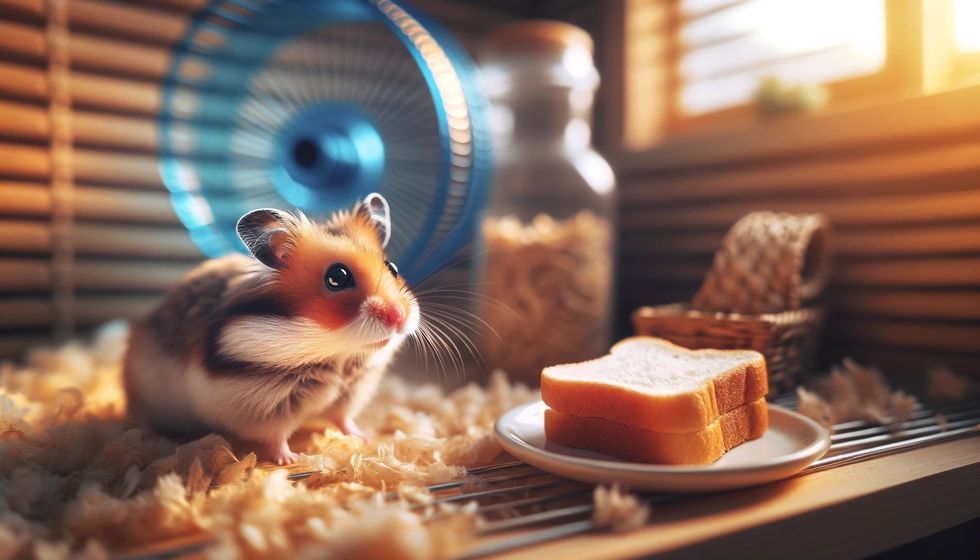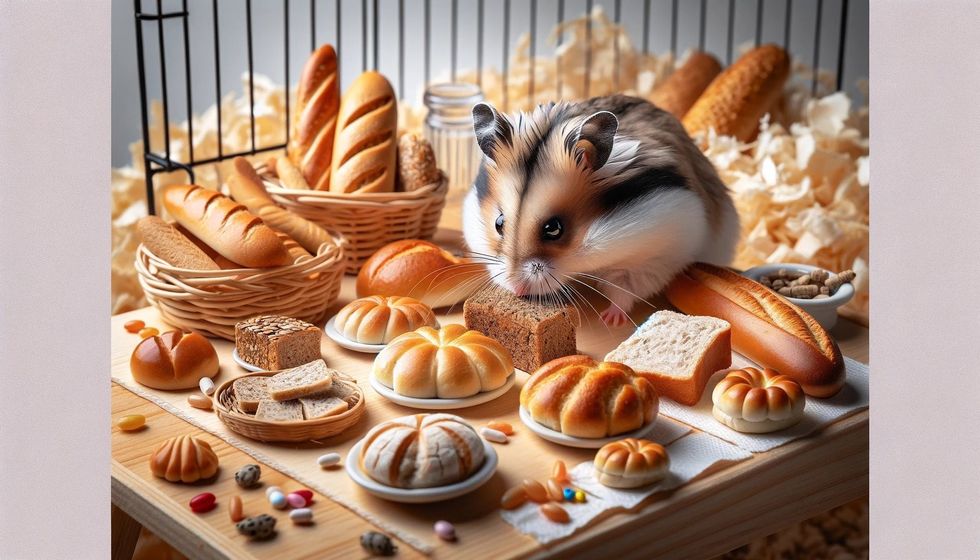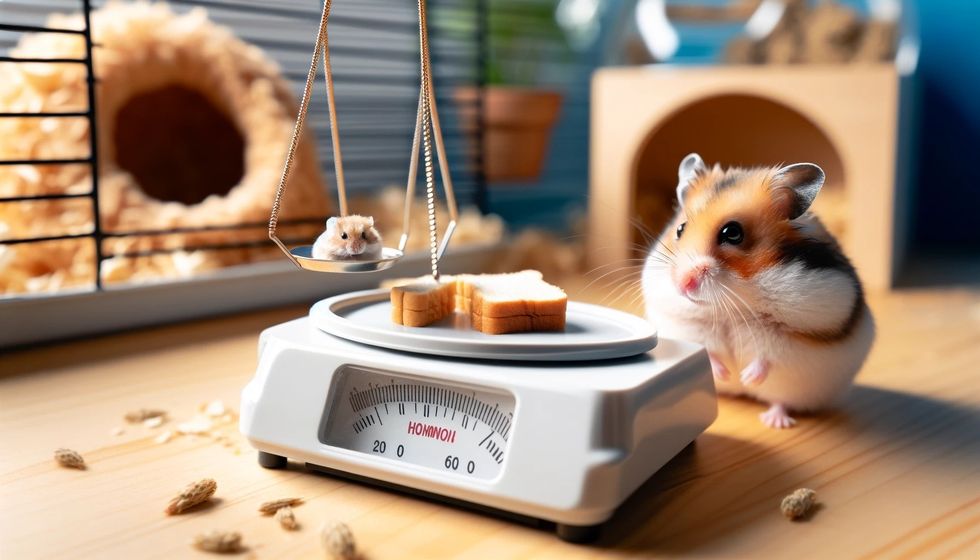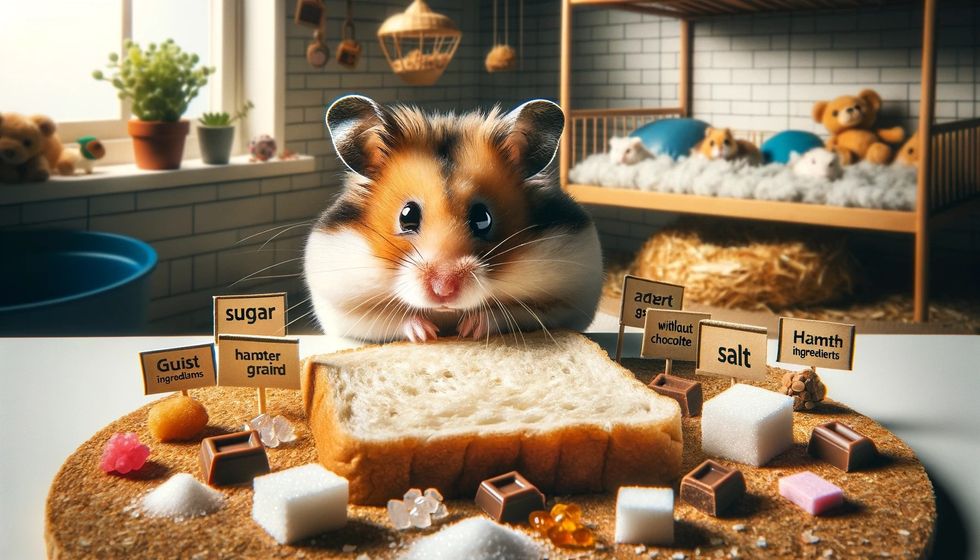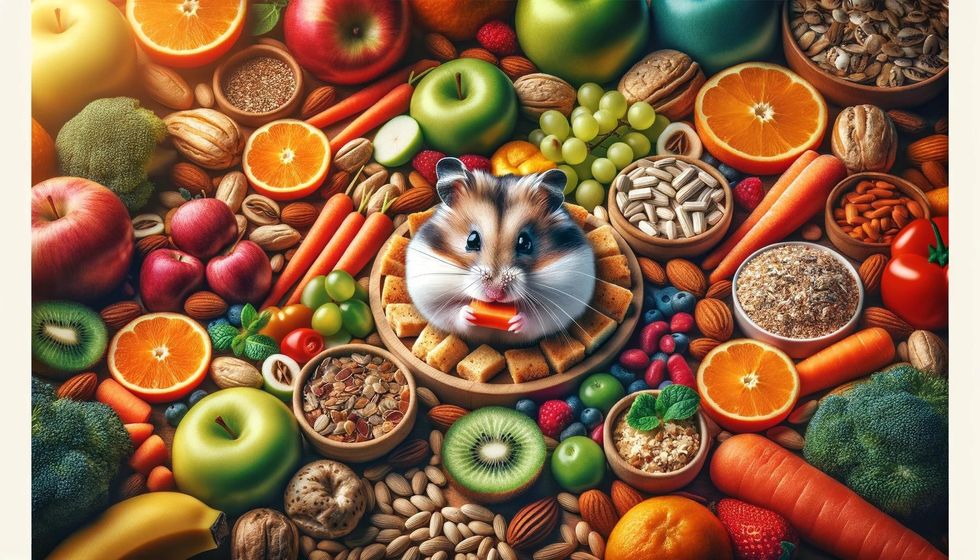Pet owners often ponder whether it's safe to feed hamsters bread, a staple in human diets. Curiosity stems from a desire to ensure the health and happiness of these small pets. Hamsters, with distinctive cheek pouches and high energy levels, especially when running on wheels, require a diet that satisfies hunger while meeting nutritional needs. The question of including bread, such as wheat, whole grain, or white varieties, in a hamster’s diet is important for those looking to provide optimal care.
As small rodents with specific dietary requirements, hamsters’ health relies on careful management of their intake. In wild habitats, their diet is a mix of seeds, cereals, insect larvae, and insects like crickets. This diverse, natural diet is dense with nutrients, equipping hamsters with essential vitamins and minerals.
In assessing bread as a food item for hamsters, its nutritional profile and role in the hamster diet must be understood. Bread, and particularly whole grain varieties, are sources of grains and seeds that harmonize with a hamster's organic diet tendencies. For instance, whole wheat bread comes fortified with magnesium and protein, aiding in the maintenance and helping to keep the heart and brain healthy.
However, moderation is key when incorporating bread into the hamster diet, ensuring it complements a range of other nourishing foods. It is particularly important to steer clear of white bread due to its heavy processing, heightened sugar content, and reduced nutritional benefit when compared to whole grain or brown bread.
While hamsters can manage small servings of specific bread types, such as whole grain or wheat bread, these should occupy a minor role in their overall diet. Bread can most times be a treat for hamsters, however, it falls short of providing the extensive nourishment required by hamsters.
Dietary staples should always consist of specially formulated hamster pellets or seed mixes, enhanced with fresh produce suitable for the species. Fostering dietary health necessitates gradually introducing new edibles in small portions, avoiding digestive disturbances, and seeking veterinary guidance concerning any diet or health uncertainties.
What kinds of bread can hamsters eat?

When determining which types of bread hamsters can consume, it’s vital to consider their nutritional requirements and how human food affects their well-being. Although hamsters can eat bread, it should be limited to whole grain or wheat bread, provided in tiny portions, and given only sporadically as a treat. A well-rounded diet tailored to a hamster's dietary needs is essential, minimizing potential health risks linked to giving them human foods such as bread.
- Whole grain bread is suitable for hamsters due to its higher nutrient and fiber content compared to white bread.
- Offer wheat bread to hamsters in small pieces and without added salt or sugar.
- Brown bread, or whole wheat bread, is healthier for hamsters than white bread, which has more sugar and is highly processed.
- Bread should be given sparingly as grains are not a major part of a hamster's natural diet.
- Avoid giving hamsters bread with added sugars or salt.
- Some hamsters may have allergies to bread ingredients such as gluten.
- Soft bread is safer for hamsters to prevent damage to their cheek pouches from hard or sharp pieces.
- Bread is best offered as an infrequent treat, not more than once every few weeks.
- While different hamster species like Syrian, Dwarf, and Roborovski have specific needs, general feeding guidelines for bread are applicable to all types.
How much bread can a hamster safely eat?

When feeding bread to a hamster, it's important to limit it to a minor, occasional component of their diet, preferably whole grain or brown bread instead of white bread. The main goal should be to ensure a well-balanced diet that fulfills all nutritional requirements of the hamster. New foods should be introduced slowly, with close observation for any potential negative effects on the pet's health.
- A tiny piece of bread around 1x1 cm is enough for a hamster and should be offered no more than once a week.
- Bread should be given sparingly as an occasional treat, not a dietary staple.
- Whole grain or brown bread, which are more nutritious than white bread, are preferable for hamsters.
- Avoid bread with harmful ingredients such as garlic, onions, or excess salt and sugar.
- Overfeeding bread can cause obesity, diabetes, and digestive problems; raw dough is toxic due to ethanol production from yeast.
- Plain, fresh bread with smooth crust pieces is safer for hamsters to prevent cheek pouch damage.
- While whole grain bread offers some benefits like magnesium and protein, it shouldn't be a significant part of their diet.
- Be aware of potential gluten intolerance in hamsters and opt for gluten-free bread if needed, checking for unsafe additives.
- Different hamster species could have distinct sensitivities and dietary restrictions, particularly dwarf hamsters with a higher diabetes risk.
What to Avoid When Feeding Bread to Hamsters

When considering whether hamsters can eat bread, it's essential to understand their dietary needs and the potential risks associated with feeding them bread. Hamsters are omnivores that require a balanced diet consisting of pellets, fresh fruits, vegetables, and occasional treats. Bread, while not toxic to hamsters, should only be given in moderation and with certain precautions due to its nutritional content and potential health implications.
- Bread high in sugar or salt can cause diabetes and hypertension in hamsters.
- Avoid bread with excess fats, artificial preservatives, or any non-natural dietary additives.
- Never feed hamsters raw bread dough because of the risk of ethanol production and alcohol poisoning.
- Ensure bread is fresh and mold-free as mold can be toxic to hamsters.
- Bread can expand in a hamster's cheek pouches or stomach, so to prevent choking lightly toast and cool the bread before giving it to them.
- Feeding bread regularly can cause a nutrient imbalance since it lacks essential vitamins and minerals.
- Bread might lead to digestive issues like constipation due to its lower fiber content.
- Introduce bread slowly as there is a chance of allergic reactions or sensitivities in hamsters.
Health Benefits and Risks of Bread for Hamsters

Understanding the health implications of feeding hamsters bread, particularly whole wheat or whole grain varieties, is critical. Although such bread can provide nutritional benefits like fiber, protein, and minerals, it should be given to hamsters only in moderation due to potential risks.
- Whole grain bread provides dietary fiber that aids in digestion and helps prevent constipation in hamsters.
- Breads enriched with B vitamins, like niacin, help energy metabolism and maintain healthy skin and nerves.
- Whole-grain bread contributes to a hamster's calcium intake, essential for strong bones and teeth.
- Iron in whole-grain bread is important for forming hemoglobin and supports overall health and vitality.
- Magnesium from whole wheat bread is crucial for muscle, nerve function, and heart health in hamsters.
- The high carbohydrate content in bread can cause obesity if hamsters are fed in large amounts or too frequently.
- Avoid breads with preservatives and additives that are unsuitable for hamsters and could cause health issues.
Alternatives to Bread in a Hamster's Diet

For a well-balanced and nutritious hamster diet beyond bread, it's important to be aware of the diverse food options that meet their nutritional requirements. By embracing a variety of dietary alternatives, owners can provide a diet that promotes the health and well-being of their hamsters.
- Hamsters can enjoy a variety of vegetables like carrots, broccoli, cabbage, cauliflower, peppers, courgette, kale, and celery, but these should be introduced in small amounts to prevent digestive issues.
- Safe fruits for hamsters include apples without seeds, pears, strawberries, blueberries, seedless grapes, and bananas, but they should be given sparingly due to their high sugar content.
- Fresh herbs such as basil, parsley, and coriander can be given as occasional treats.
- Small pieces of cooked pasta can be a good source of protein for hamsters.
- A bit of hard-boiled egg offers essential proteins.
- High-protein snacks like mealworms and crickets are suitable for hamsters.
- Nuts provided in moderation are high in protein but also high in fat.
- Commercial hamster foods are designed to meet all nutritional needs and should be primary in their diet.
- Pellet-type or rodent block foods help prevent selective eating and ensure a balanced nutrient intake.
- Clean, fresh water is essential and should be available at all times.
- Muesli-based diets are discouraged as they can lead to selective eating, weight issues, and dental problems.
- Variety in the diet provides balance, and environmental enrichment, and simulates natural foraging behavior.
FAQs
Can hamsters have white bread as part of their diet?
No, whitebread is not recommended for hamsters because it is highly processed, contains added sugars, and has lower nutritional value than whole grain or wheat bread. White bread can lead to health issues such as obesity and diabetes in hamsters due to its high carbohydrate content and lack of essential nutrients.
How often can I give my hamster bread as a treat?
Bread should be considered a rare treat for hamsters and given no more than once every few weeks to avoid health issues such as obesity and diabetes. It's important to monitor the amount of bread given to ensure it does not become a significant part of their diet.
Are there any types of bread that are entirely safe for hamsters?
Whole grain or wheat bread without added salt, sugar, and other harmful ingredients can be safe for hamsters in very small amounts. These types of bread are less processed and contain more nutrients than white bread, making them a slightly better option if you choose to give bread as an occasional treat.
What are some healthy alternatives to bread for my hamster’s diet?
Instead of bread, provide your hamster with a balanced diet including fresh vegetables, fruits, and high-quality commercial hamster food mix to ensure they receive all the necessary nutrients.
Fresh, clean vegetables like squash, carrots, broccoli, cucumber, cauliflower, spinach, romaine lettuce, and other greens, as well as fresh fruits like apples, pears, bananas, grapes, and most berries (excluding citrus fruits), are good options. Protein sources such as boiled eggs or scrambled eggs can also be included as occasional treats.
Can hamsters eat foods high in sugar?
While hamsters can technically consume foods that are high in sugar, it is not recommended as part of their regular diet. Foods with high sugar content can cause health problems such as diabetes and obesity, especially in dwarf hamsters which are easily affected by these conditions. It's important to provide a balanced diet that limits sugary treats to maintain your hamster's health and well-being.
Hamsters can indeed consume bread, but it should be given in moderation. Whole grain, brown, or whole wheat bread can be offered to hamsters in very small amounts as an occasional treat. It is important to prioritize a balanced diet for hamsters that mainly consists of hamster-specific food, fresh vegetables, fruits, and adequate protein sources to maintain their health and well-being.
Related Articles Around the Web


